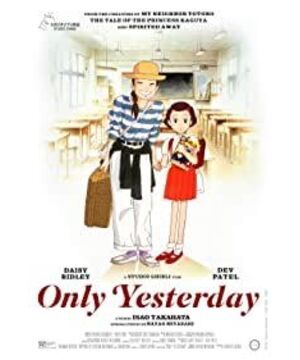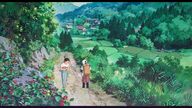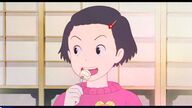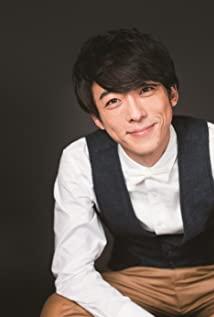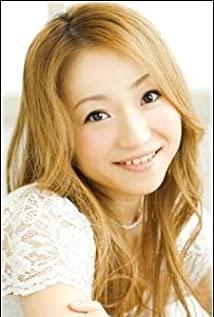The little girl was stunned, and after a while, she replied, "It's cloudy." The
little boy was overjoyed: "Me too." After speaking, the little boy turned and left. The little girl walked to the sky step by step, swimming freely in the air...
This feeling is quite similar to the hazy feeling of the sentence "The boy in the next class, why didn't he pass by my window" in Luo Dayou's "Childhood" . Seeing this, my heart is also a little bit sour, and a little bit dazed, I don't know what day it will be.
This is an excerpt from Hayao Miyazaki's early work, "The Little Bits of Memories."
The city girl Taeko, who was born in Tokyo and grew up in Tokyo, has always had a heart for the countryside. At the age of 27, she has a stable job, but she still has to use ten days of vacation every year to go to the countryside to experience rural life. This time, for some unknown reason, Taeko, a fifth-grade elementary school student, accompanies her on the train out of town.
The whole film is long, and there is no amazing plot, but it makes people willing to watch it. Interspersed with reality and memories, some truths slowly emerged. This is a typical Japanese movie. The way the clips are interspersed and the relationship between the events and the ideas they want to express has a transition and a strange astringency typical of Japanese films. The Japanese logic is strange. Japanese films often talk about some philosophies of life and the like, which seem to be quite reasonable. If you think about it, there are jumps here and there. Earlier I thought it was a translation problem, but after reading more, I thought it was their way of thinking that was fundamentally different. If you look at it with a heart of unrepentant acceptance, you can still get some inspiration and appreciate a little more of their films.
Taeko, who was in the fifth grade of elementary school, was a willful, eccentric, well-behaved, and sensible child. She is so ordinary, yet absolutely different. Because she has her own judgment on things and sticks to it. She doesn't do things she can't understand that everyone tells her is right, and at the same time she does things that she's very reluctant to do and that no one around her can do. At such a young age, she had her own principles. Mother and sister didn't understand her and thought she was stupid or weird. But there are also people who like her very much, because she is a kind child with a rich heart.
The grown-up Taeko has a job that others envy, and seems to be as busy as a Tokyoite. But in her bones, she was still a little girl at the age of eleven. He loves the countryside, has his own ideas about things, is willful, eccentric and sensible. No wonder Jun Lang, the silly boy, is fascinated by her.
On the eve of leaving, grandma made an amazing request: if you like it here, just stay and be with Jun Lang. Even Jun Lang's parents felt abrupt, but grandma insisted. Hehe, she is an old man after all, and she can see her love from her heart based on her experience. At the same time, the elderly have the same willfulness as children. Mom quickly turned away. Only Dad, is the eternal opponent. Perhaps the responsibility of being a father is the heaviest, so it is always the most realistic and the least considerate of people's emotions. That silly boy, handsome, has been kept in the dark.
I like it, I like it, it is inevitable to hesitate in the face of such a big decision. Taeko began to wonder if his love for the countryside was whether Duke Ye was fond of dragons. Fortunately, there is Junlang, and the knot is untied.
When saying goodbye at the station, Taeko said: Next time, I will definitely not bring my fifth-grade self with me. why? Was Taeko bad at that time? I don't think so. It's just that the knot in the heart has been untied, and there is no need to worry about it anymore.
I absolutely love the ending of the video. So many childhood classmates got on the train, including the childhood self...
At first glance, this film is more realistic, with less mythology, and is less like Hayao Miyazaki. But after a closer look, this time, like the later films, there is no separation from the theme of human and nature. Also like Hayao Miyazaki's consistent style, the music and pictures are beautiful and delicate. I like the dynamism of the car driving on the mountain road, the folk songs played when picking safflower, and the process of making safflower dye, which is very rural.
Except for the music and pictures, I can't say what's so good about this film, but it made me think about it when I didn't finish it, and I kept thinking about it after watching it.
View more about Only Yesterday reviews


